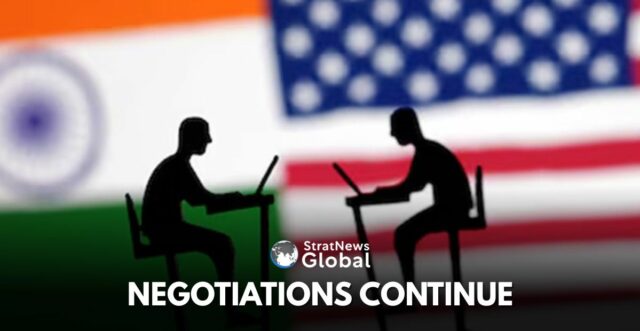An Indian delegation is set to visit the United States soon for trade talks, a government official said, as both nations work to resolve disputes over tariffs on auto parts, steel, and agricultural products.
India is among the few countries that are still negotiating a trade deal with Washington, as President Donald Trump ramps up his trade war with the threat of sharply higher tariffs from August 1.
A team of Indian officials on an extended visit to the U.S. recently failed to secure a deal as the two countries were unable to overcome some key hurdles.
India is resisting opening up its agriculture and dairy sectors while asking for a favourable tariff for its goods entering the U.S. compared to countries like Vietnam and China.
“Indian team will visit the U.S. soon for further talks,” said the trade official, who did not want to be named.
The trade ministry did not immediately reply to an e-mail seeking comments.
Last week, India’s Trade Minister Piyush Goyal said the country will only make deals in its national interest.
New Delhi has proposed retaliatory duties against the U.S. at the World Trade Organisation, saying Washington’s 25% tariff on automobiles and some auto parts would affect $2.89 billion of India’s exports.
“We are engaged with the U.S. team through virtual and physical meetings,” the official said, adding that India still aims to conclude the first tranche of the deal by fall.
Ongoing Trade Negotiations
Since April 2025, when President Trump enacted sweeping “reciprocal tariffs” beginning at a 10% baseline and rising to 26% on April 9, India was among the countries hit.
India and the U.S. have engaged in continuous, high-stakes trade negotiations. The tariffs targeted key sectors like autos, steel, electronics, gems and jewellery, while sparing strategic areas such as pharmaceuticals and semiconductors.
India responded strategically by offering to substantially cut or eliminate tariffs on over $23 billion worth of U.S. imports—about 55% of the targeted goods—potentially shielding $66 billion of exports.
To forestall the tariff wave set for April 2, high-level talks began in March, including U.S. Assistant Trade Rep. Brendan Lynch visiting India and senior Indian ministers meeting in Washington.
Discussions now span sector-specific working groups under a proposed Bilateral Trade Agreement (BTA), aiming for a first-phase deal by fall 2025.
India is willing to cut duties on U.S. autos, EVs, alcoholic beverages, and select farm produce, while firmly protecting agriculture, dairy, GM crops, and smallholder farmers.
Despite pressure, India views the tariffs as a negotiating lever—not a crisis—with assessments from Niti Aayog suggesting limited damage and potential export opportunities.
Both sides remain optimistic that a framework deal can be reached before the August 1 reciprocal tariff deadline is reinstated.
(With inputs from Reuters and IBNS)





